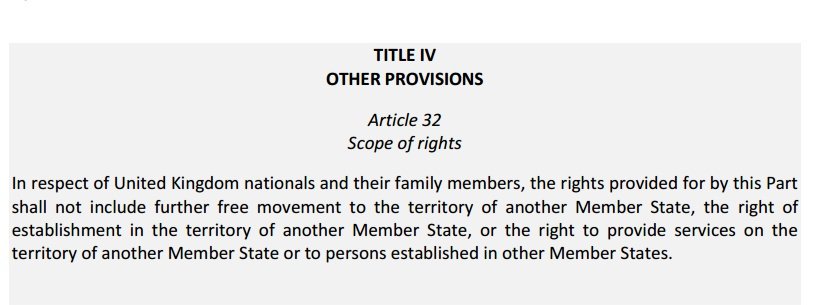As regards freedom of movement, in most aspects other than the ones below, the Agreement recites and repeats the same conditions as Directive 2004/38/EC.
Preliminary observations
a) Part 2 (governing EU/EEA citizens in the UK & UK citizens in the EEA) will have direct effect and "Any provisions inconsistent or incompatible with that Part shall be disapplied". (Part One, Article 4, Paragraph 1)
While Paragraph 2 states that the UK "shall ensure compliance with paragraph 1 ...through domestic primary legislation", it is worth remembering that in UK constitutional law, "no Parliament may bind its successor".
b) It is still unclear whether the SS and Zambrano routes are protected. My interpretation is that the derivative rights routes (SS, Zambrano/Chen and possibly Lounes) are not covered under the Agreement.
Does residing in the UK after working in another EEA member-state count as exercising "their right of residence in accordance with Union law before the end of the transition period" for a UK citizen?Part One, Article 6
For the purposes of this Agreement, all references to Member States and competent authorities of Member States in provisions of Union law made applicable by this Agreement shall be read as including the United Kingdom and its competent authorities,...
Part Two, Article 8, Paragraph (c)
"host State" means:
(i) in respect of Union citizens, the United Kingdom if they exercised there their right of residence in accordance with Union law before the end of the transition period and continue to reside there thereafter;
(ii) in respect of United Kingdom nationals, the Member State in which they exercised their right of residence in accordance with Union law before the end of the transition period and continue to reside there thereafter;
Article 9 talks of family members who are resident under the terms of the Directive in their host state. But the SS, Zambrano and Lounes routes are explicitly not under the Directive, but derivative rights from the Treaties. Therefore, it is possible to argue that they may not be included in the Withdrawal Agreement.
Again, note specifically the lack of mention of any provision for non-EEA family members with derivative rights under the Treaties, which is explicitly mentioned for EU and UK citizens themselves in Paragraphs 1 & 2. Interestingly, EEA family members have been explicitly provided for separately under Paragraph 2.Part Two, Article 12
1. Union citizens and United Kingdom nationals shall have the right to reside in the host State under the limitations and conditions as set out in Articles 21, 45 or 49 TFEU and in Article 6(1), Article 7(1)(a), (b) or (c), Article 7(3), Article 14, Article 16(1) or Article 17(1) of Directive 2004/38/EC.
2. Family members who are either Union citizens or United Kingdom nationals shall have the right to reside in the host State as set out in Article 21 TFEU and in Article 6(1), Article 7(1)(d), Article 12(1) or (3), Article 13(1), Article 14, Article 16(1) or Article 17(3) and (4) of Directive 2004/38/EC.
3. Family members who are neither Union citizens nor United Kingdom nationals shall have the right to reside in the host State as set out in Article 6(2), Article 7(2), Article 12(2) or (3), Article 13(2), Article 14, Article 16(2), Article 17(3) or (4) or Article 18 of Directive 2004/38/EC.
c) PR to be lost after an absence of five years rather than two, as at present.
d) The replacement of existing documentation issued under EU law (Residence Certificate/Card, etc) will be free of charge.Part Two, Article 14, Paragraph 3
Once acquired, the right of permanent residence shall be lost only through absence from the host State for a period exceeding five consecutive years.
e) The list of documents that the host state can ask for is specified in Paragraph 1(k) through to (m) of the above Article. That logically means that the UK cannot ask for any proof other than that listed in these paragraphs.Part Two, Article 17, Paragraph 1(h)
persons who, before the end of the transition period, are holders of a valid permanent residence document issued under Article 19 or 20 of Directive 2004/38/EC or a valid domestic immigration document conferring a permanent right to reside in the host State, shall have the right to exchange that document within two years of the end of the transition period for a new residence document after a verification of their identity, a criminality and security check in accordance with point (p) of this paragraph and confirmation of ongoing residence; such a document shall be free of charge;






